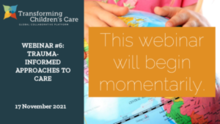Background:
Children living in families and within alternative care can and do experience traumatic events. These can be caused by violence, illness, parental death, natural or human made disasters, and separation. The COVID-19 pandemic and the changes, losses, and stressors it has caused is one more reminder of the difficulties that face children in all corners of the world. Understanding how trauma can impact the brain and affect emotional and physical development is of critical importance for those directly engaging with children and families. Trauma-informed responses vary according to culture and context; all of them recognize the importance of working with the child, family and the wider community to promote resilience and recovery.
This webinar, the sixth in the Transforming Children's Care Webinar Series, provided an introduction to trauma-informed care from various perspectives and vantage points. The webinar provided a basic understanding of trauma-informed care and different approaches and tools that have been used in a range of contexts and with various populations of children and those around them.
Los niños, niñas y adolescentes (NNA) que viven en familia y dentro de los diferentes modelos de cuidado alternativo. pueden vivir eventos traumáticos. Estos pueden ser causados por violencia, enfermedad, fallecimiento de los padres, desastres naturales o también provocados por la situación de separación de los NNA de su entorno familiar. La pandemia de COVID-19, el confinamiento obligado, los cambios de vida, las pérdidas de los familiares y amigos han sido factores estresantes los cuales nos hacen recordar sobre todas las dificultades que enfrentan los NNA en todos los rincones del mundo, ante cualquier circunstancia que afecte su bienestar. Comprender cómo el trauma puede afectar el cerebro y afectar el desarrollo emocional y físico es de importancia primordial para aquellos que se relacionan directamente con ellos o ellas y sus familias. La implementación de programas, intervenciones y acciones de cuidado informado del trauma varía según la cultura y el contexto; todos ellos reconocen la importancia de trabajar con la niñez, adolescencia, la familia y la comunidad para promover la resiliencia y la recuperación.
Este webinar proporcionará una introducción al cuidado informado sobre el trauma desde varias perspectivas y puntos de vista, teniendo como objetivo, proporcionar una comprensión básica de la atención informada sobre el trauma; los diferentes enfoques y herramientas que se han utilizado en una variedad de contextos y con varias poblaciones de niños, niñas, adolecentes y quienes los rodean.
Additional Resources / Recursos adicionales:
-
Promoting Resilience-Informed Care: A practical guidance resource for frontline workers in family based care
Changing the Way We Care,
* Changing the Way We Care is happy to have the resilience guidance used and even adapted! Please do reference the guidance. They would like to know how you have used it - you can reach them via info@ctwwc.org for additional information.
-
Recommendations for Advocacy to Advance Trauma-Informed Care
Hope and Homes for Children
-
PACES Connection
This is a great resource and community of practice. Their goal is to create and support trauma-informed communities around the world.
- Child Trauma Screening Questionnaire (CTSQ)
Used with children 7-16 years old.
-
Strengths and Difficulties Questionnaire (SDQ)
Not trauma specific but widely used by non-specialists to screen and assess progress before/after psychosocial intervention for 3-16 years old (Note: Includes a parent and teacher self-report tool for young children (i.e. 2-4 years old as well as 4-17 years old).
-
Exploring Trauma-informed Foster Care as a Framework to Support Collaborative Social Worker - Foster Carer Relationships
Maria Lotty - Irish Journal of Applied Social Studies,
-
Restorative Parenting: Delivering Trauma-Informed Residential Care for Children in Care
SL Parry, T Williams & C Burbidge - Child & Youth Care Forum,
-
Attachment After Adversity: Building Resilience through Relationships
Christian Alliance for Orphans (CAFO),
-
Trauma-Informed Care Research: Implications for Foster Care Practice
Maria Lotty - Relational Child and Youth Care Practice,
- An Exploration of the Role of Trauma-Informed Care in Fostering Stability
Maria Lotty - The Irish Social Worker,
- Attitudes Towards Trauma-Informed Care in Residential Out-of-Home Care
Emma Galvin, Renee O'Donnell, Aya Mousa, Nick Halfpenny, Helen Skouteris - Children and Youth Services Review,
- Blog: Diverse Outcomes After Trauma
Florence Koenderink, Family-Based Solutions, 9 Dec 2020

